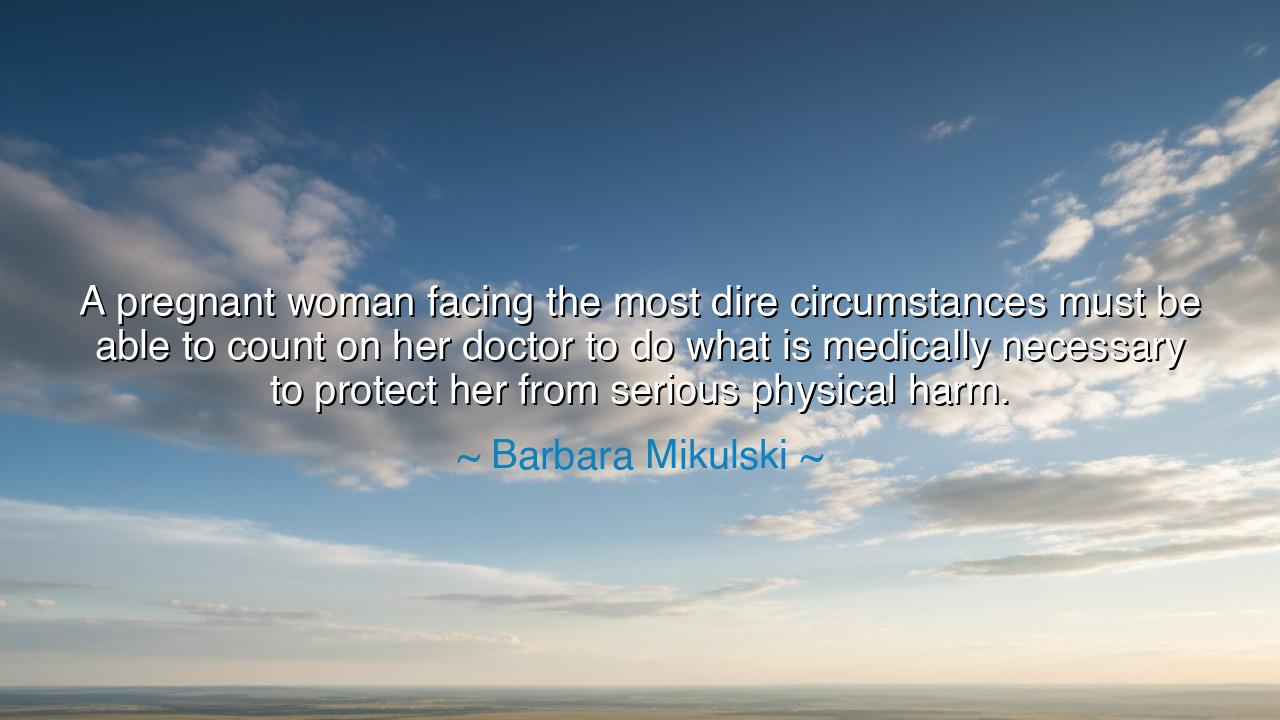
A pregnant woman facing the most dire circumstances must be able
A pregnant woman facing the most dire circumstances must be able to count on her doctor to do what is medically necessary to protect her from serious physical harm.






"A pregnant woman facing the most dire circumstances must be able to count on her doctor to do what is medically necessary to protect her from serious physical harm." These words from Barbara Mikulski echo a powerful and deeply human truth: when faced with the trials and vulnerabilities of pregnancy, a woman must be able to trust in the expertise and judgment of her doctor, particularly when the stakes are as high as her health and the life of her child. This quote calls for compassion and moral responsibility in medical practice—ensuring that the health of the mother is protected with the same care and urgency as that of the unborn child. In times of great uncertainty, medical professionals must uphold their ethical duty to protect and serve, with an unwavering commitment to the well-being of both patient and child.
In the ancient world, pregnancy and childbirth were often fraught with danger, and the role of the healer—whether a midwife or a physician—was revered as a matter of great importance. In ancient Egypt, the goddess Taweret, often depicted as a hippo, was the protector of women during pregnancy and childbirth, embodying the deep care and protection that was necessary during this time of life. Women in these times relied heavily on the wisdom of the healers and midwives who not only helped them give birth but ensured that they survived the process. In such cultures, the role of the healer was sacred, as it was understood that life itself—both the mother’s and the child’s—was a gift, and protecting that life was a profound responsibility.
Similarly, the Greeks had their own understanding of the sacredness of childbirth and the ethical duties of the medical professional. Hippocrates, the father of medicine, wrote extensively on the role of doctors in maintaining the health of both mother and child. In his Hippocratic Oath, he pledged to do no harm—a promise that includes ensuring the safety of the mother during pregnancy and childbirth. The oath, while centuries old, is rooted in the belief that medicine is not just about treating disease, but about protecting the most vulnerable. In this way, the role of the doctor was seen as a protector—not just of physical health, but of life itself, with the doctor charged to ensure that all necessary measures were taken to prevent harm.
Fast forward to modern times, and the medical field continues to grapple with the delicate balance between protecting both the mother’s health and the unborn child’s life. The 20th century saw major advancements in medical care, with the introduction of better surgical procedures, medications, and the ability to address complications before they became life-threatening. Yet, despite these advancements, the same ethical dilemmas remain—how to balance the needs of the mother with the rights of the unborn. The story of maternal health is not just about biology, but about the moral choices made by those who provide care. Mikulski’s statement is a call to action, ensuring that doctors act in accordance with their ethical duties, providing the necessary care even when it’s difficult, controversial, or challenging.
One such example in history is the story of Dr. Virginia Apgar, an obstetrical anesthetist who created the Apgar Score in 1952. This scoring system became a standard for assessing the health of newborns immediately after birth. Dr. Apgar’s work exemplified the commitment to protecting life—both the mother’s and the child’s. Her dedication to advancing medical practice was rooted in the understanding that every life is valuable, and that physicians have the responsibility to act quickly and decisively when it comes to the well-being of both mother and child. Her work reminds us that medicine is a moral endeavor, where every decision, every action, is weighed against the responsibility of preserving life and health.
The lesson in Mikulski’s words is clear: trust in the medical profession is built on integrity, compassion, and responsibility. A doctor’s duty is not just to provide technical expertise but to ensure that they act in the best interests of the patient, particularly in circumstances as critical as childbirth. Pregnant women, in times of vulnerability, must be able to trust that their healthcare provider will act swiftly and decisively to ensure their health and safety, without hesitation or undue influence. The well-being of both mother and child must always be prioritized.
In our own lives, we must advocate for compassionate and responsible care in every aspect of healthcare. Whether as patients, caregivers, or medical professionals, we must uphold the ethical duty of ensuring that life, especially in its most vulnerable states, is treated with the utmost respect and care. Just as ancient healers understood the sacredness of protecting life during pregnancy, so must we embrace the timeless responsibility to care for the most vulnerable among us. We must strive for a world where medical professionals are empowered to make the necessary decisions in the best interest of life—both for the mother and the child.






AAdministratorAdministrator
Welcome, honored guests. Please leave a comment, we will respond soon